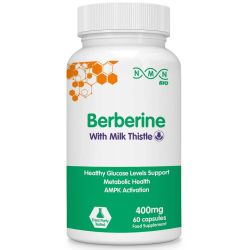Berberine supplements
Berberine is a bioactive compound extracted from various plants, including Berberis vulgaris (barberry), Coptis chinensis (Chinese goldthread), and Hydrastis canadensis (goldenseal).
Berberine supplements are well-known for their ability to support healthy blood sugar levels and improve insulin sensitivity, making it a popular choice for those managing type 2 diabetes. Additionally, it may aid in weight management by enhancing metabolism and promoting fat loss as a 'natural GLP-1 supplement'.
Read more: Everything you need to know about Berberine
All you need to know about Berberine
What is Berberine used for?
Berberine is commonly used to support healthy blood sugar levels, aid in weight management, and promote cardiovascular health. It has been widely studied for its potential to improve insulin sensitivity and metabolic function.
Is Berberine safe to take daily?
Berberine is generally considered safe for daily use when taken within recommended doses. However, it's important to consult with a healthcare professional, especially if you have any underlying health conditions or are taking other medications.
How long does it take for Berberine to work?
Berberine typically starts to show effects on blood sugar regulation and metabolism within a few weeks of consistent use. For more significant benefits, it may take 2-3 months of regular supplementation. However, results will vary for each person. Read more: Best Berberine Supplements 2024
Can Berberine help with weight loss?
Yes, Berberine may aid in weight loss by improving insulin sensitivity and promoting fat metabolism. It can also help regulate blood sugar, which may reduce cravings and support overall weight management efforts. Read more here: Does Berberine Help With Weight Loss?
Does Berberine lower cholesterol?
Yes, studies suggest that Berberine can help lower LDL cholesterol and triglyceride levels, supporting heart health. It works by improving the body’s ability to metabolise fats and regulate cholesterol production.
What are the side effects of Berberine?
Common side effects of Berberine may include digestive issues such as stomach cramps, diarrhoea, or constipation. These are typically mild and can often be managed by adjusting the dosage or taking Berberine with food.
What is the best time to take berberine?
For optimal results, berberine is often taken with meals to enhance its effects on blood sugar regulation and metabolic health.
Is berberine safe to take with other medications?
While berberine is generally safe, it can interact with certain medications, particularly those affecting blood sugar. Consulting a healthcare professional is recommended before combining supplements.



















